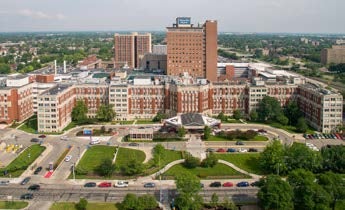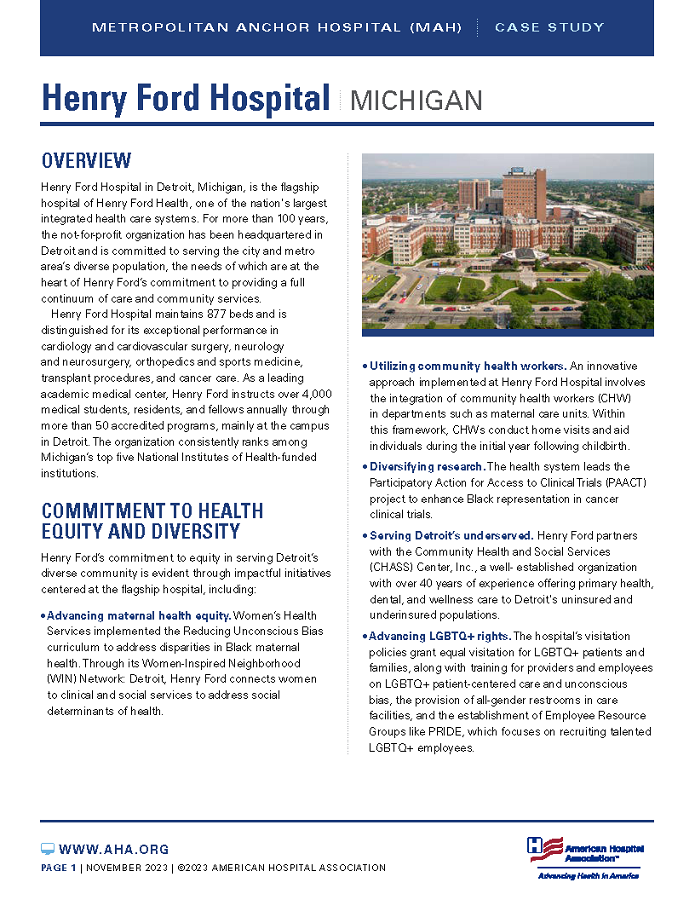

Henry Ford Hospital | Michigan
Metropolitan Anchor Hospital (MAH) | Case Study
Overview
 Henry Ford Hospital in Detroit, Michigan, is the flagship hospital of Henry Ford Health, one of the nation's largest integrated health care systems. For more than 100 years, the not-for-profit organization has been headquartered in Detroit and is committed to serving the city and metro area’s diverse population, the needs of which are at the heart of Henry Ford’s commitment to providing a full continuum of care and community services.
Henry Ford Hospital in Detroit, Michigan, is the flagship hospital of Henry Ford Health, one of the nation's largest integrated health care systems. For more than 100 years, the not-for-profit organization has been headquartered in Detroit and is committed to serving the city and metro area’s diverse population, the needs of which are at the heart of Henry Ford’s commitment to providing a full continuum of care and community services.
Henry Ford Hospital maintains 877 beds and is distinguished for its exceptional performance in cardiology and cardiovascular surgery, neurology and neurosurgery, orthopedics and sports medicine, transplant procedures, and cancer care. As a leading academic medical center, Henry Ford instructs over 4,000 medical students, residents, and fellows annually through more than 50 accredited programs, mainly at the campus in Detroit. The organization consistently ranks among Michigan’s top five National Institutes of Health-funded institutions.
Commitment to Health Equity and Diversity
Henry Ford’s commitment to equity in serving Detroit’s diverse community is evident through impactful initiatives centered at the flagship hospital, including:
Advancing Maternal Health Equity
Women’s Health Services implemented the Reducing Unconscious Bias curriculum to address disparities in Black maternal health. Through its Women-Inspired Neighborhood (WIN) Network: Detroit, Henry Ford connects women to clinical and social services to address social determinants of health.
Utilizing Community Health Workers
An innovative approach implemented at Henry Ford Hospital involves the integration of community health workers (CHW) in departments such as maternal care units. Within this framework, CHWs conduct home visits and aid individuals during the initial year following childbirth.
Diversifying Research
The health system leads the Participatory Action for Access to Clinical Trials (PAACT) project to enhance Black representation in cancer clinical trials.
Serving Detroit’s Underserved
Henry Ford partners with the Community Health and Social Services (CHASS) Center, Inc., a well- established organization with over 40 years of experience offering primary health, dental, and wellness care to Detroit's uninsured and underinsured populations.
Advancing LGBTQ+ Rights
The hospital’s visitation policies grant equal visitation for LGBTQ+ patients and families, along with training for providers and employees on LGBTQ+ patient-centered care and unconscious bias, the provision of all-gender restrooms in care facilities, and the establishment of Employee Resource Groups like PRIDE, which focuses on recruiting talented LGBTQ+ employees.
Putting the Community at the Forefront of Care
Henry Ford’s community outreach programs are designed to address the specific health needs of Detroiters. These initiatives encompass a wide range of services, including food pantries, exercise programs, tobacco cessation programs, vaccination clinics, and cancer screenings. One such program is Generation With Promise, a community health program that aims to promote healthy lifestyles among Detroit's youth, families, and communities. The program collaborates with local schools to improve students' health behaviors, partnering with organizations like Gleaners Community Food Bank, to offer Cooking Matters™ nutrition education and cooking curriculum to families and faith-based groups.
Patient–Payer Mix and Community Benefits
As a Metropolitan Anchor Hospital (MAH), Henry Ford Hospital serves a diverse patient-payer mix. Half of Henry Ford's revenue comes from Medicare, while 20% of the patient population is covered by Medicaid, and 30% by commercial insurance. With most patients relying on government payers for their health care coverage, a burden is placed on the organization’s finances because Medicare and Medicaid reimburse at levels much lower than the actual costs of providing care. In 2022, Henry Ford provided $1 billion in community benefits, including uncompensated care; much of this came from Henry Ford Hospital.
Serving as an Economic Anchor Institution
Henry Ford Hospital is more than a health care organization; it is an economic anchor in the Detroit community. In 2023, in collaboration with Tom Gores and the Detroit Pistons, and Michigan State University, Henry Ford unveiled a multibillion-dollar development plan for Detroit's New Center neighborhood. The plan includes a major expansion of Henry Ford Hospital, a cutting-edge medical research facility, and enhanced partnerships between the involved parties. The development envisions economic growth, health care advancements, commitments to environmental sustainability, and a revitalized urban environment.
Henry Ford Hospital’s community investments positively impact Detroit neighborhoods through hiring, purchasing, and community programming. Henry Ford is a founding member of the Healthcare Anchor Network (HAN), a collaboration of 65 leading health care systems aiming to create inclusive and sustainable local economies to address economic and racial inequities that contribute to poor health. HAN's mission involves leveraging health systems' assets like hiring, purchasing, and investing to foster economically and racially equitable communities.
In partnership with other health systems, Henry Ford has committed to an "Impact Purchasing Commitment" pledge to support local, minority, women-owned, and small businesses. The organization also has a commitment to hiring from within the local community, with 10% of frontline employees coming from three ZIP codes adjacent to the Detroit hospital.
Metropolitan Anchor Hospitals Need Support
Henry Ford’s commitment to community-based care and dedication to patient well-being make the organization an essential anchor institution in Detroit and beyond. As a MAH, Henry Ford Hospital faces financial challenges due to its patient-payer mix and reliance on government payers. Hospitals are underpaid by Medicare and Medicaid and continued threats to state and federal provider reimbursement represent an ongoing concern. This impacts Henry Ford Hospital's ability to improve access to care for historically marginalized communities. Additional, sustained funding for MAHs is essential to sustaining the hospital’s comprehensive health care services and its ability to serve its community.


